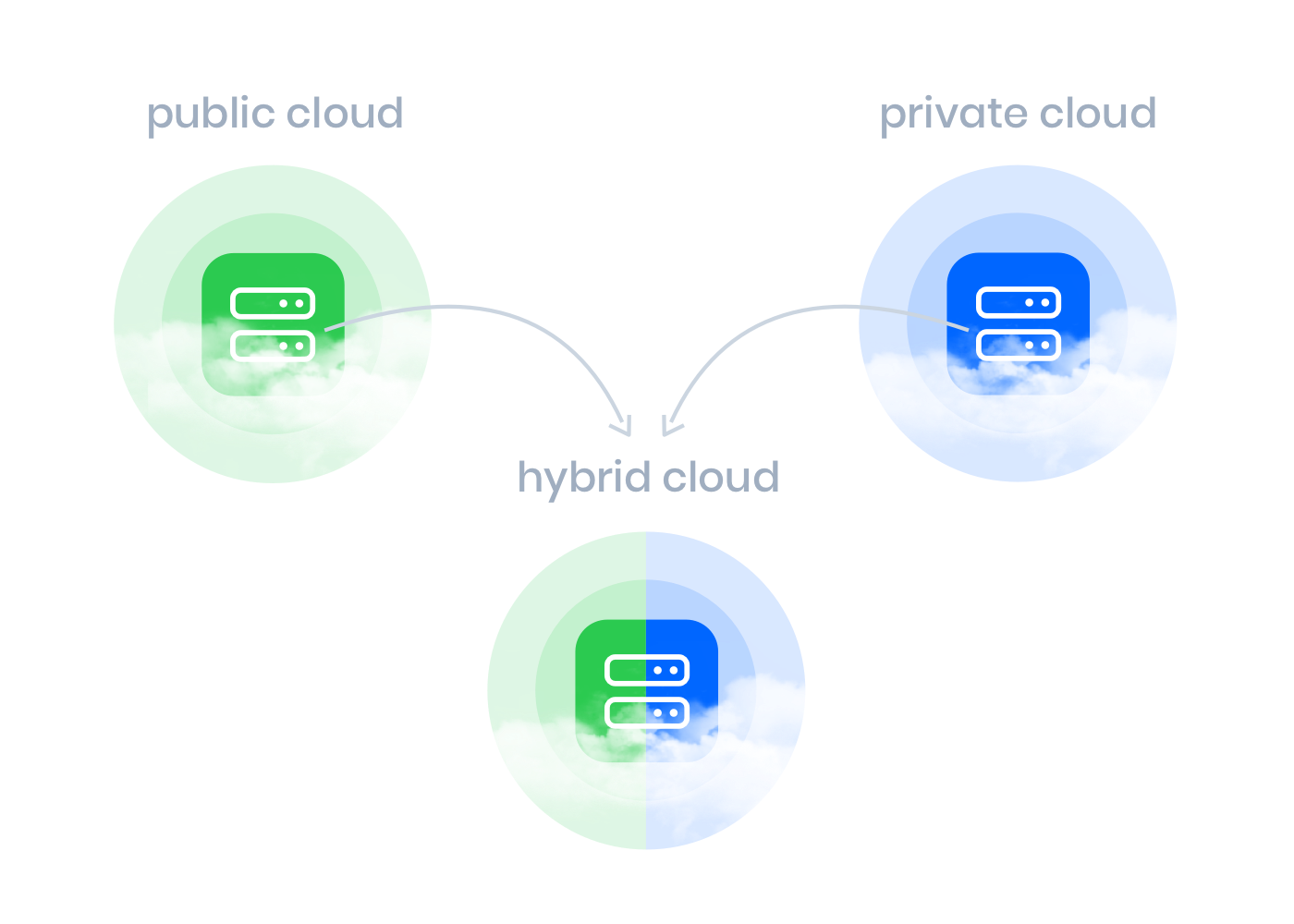Explained: What is public cloud?

Leave that stuffy archive in your company and store your data in the cloud. It's safer, faster, and more flexible. If you want to make the transition to the cloud in an accessible way, choose public cloud. What do you get? All the benefits of cloud hosting. And what don't you get? A high bill because you share the infrastructure with other users.
- Meaning of public cloud
- Benefits of the public cloud
- Disadvantages of the public cloud
- Difference between public cloud, private cloud, and hybrid cloud
- What you should definitely know about the private cloud:
- What you should definitely know about hybrid cloud:
- Providers of public cloud
- Choose Combell as your public cloud provider
- These customers are already working in the public cloud
- Future looking bright
- Public Cloud for your data?
Meaning of public cloud
The cloud is essentially a network of servers. When you work in the cloud, you are not (solely) working on your own hardware (your computer or your company's infrastructure) where your own software is installed, but you are working via the internet or another network on servers located elsewhere.
If you were to specifically look up the meaning of public cloud in a dusty encyclopedia - perhaps there's one in your outdated archive room 😉 - you would probably get this definition:
Definition
Public cloud is a type of cloud computing model in which cloud resources, such as servers and applications, are offered to the public via the internet. A public cloud is managed by cloud service providers and offers benefits such as flexibility, scalability, and lower costs.
In other words: you work in the cloud, but the secure, high-performance, and scalable operation of the cloud architecture is shared with other users. What you do not share with anyone else: your company's data or other important information. Those are only accessible to you.
Only pay for what you use
So, you are not the owner of the hardware and do not have access to the physical location where the hardware is located. The provider takes care of maintenance and updates of the infrastructure they provide. Generally, you pay a fixed amount per month/year for what you use (Pay-per-Use).

Benefits of the public cloud
Cloud implementation is gaining popularity. More and more (startup) entrepreneurs are discovering the advantages of, among other things, the public cloud. Knowing what this cloud solution has to offer can help you make a more informed decision about whether or not to migrate to the cloud.
Also read
Disadvantages of the public cloud
Of course, we also need to discuss the disadvantages and considerations of the public cloud. You should consider these factors alongside the advantages of the public cloud. These insights will help you decide whether or not to switch to the cloud.

Difference between public cloud, private cloud, and hybrid cloud
Working in the cloud saves you costs and time. But which cloud solution should you choose for your data? The focus of this article is on the public cloud. As mentioned, the public cloud is the cloud implementation where you share the infrastructure (and the bill).
However, to determine if the public cloud is suitable for you, you also need to understand what private cloud and hybrid cloud are. Choosing between the public cloud, private cloud, or hybrid cloud? We will delve deeper into that in another blog post.
What you should definitely know about the private cloud:
In contrast to the public cloud, with private clouds, you do have a completely isolated environment. So, you do not end up on shared cloud infrastructure. This private cloud can be hosted by a cloud hosting provider or on your own infrastructure within the walls of your company (On-premise).
Private clouds provide an environment exclusively tailored for you and do not run on shared hardware. This is the opposite of a public cloud where it's not predetermined on which machines your data will run, and the physical hardware is shared with other customers.
What you should definitely know about hybrid cloud:
There are many definitions of a hybrid cloud. Some sources refer to a hybrid cloud as a combination of the cloud with on-premises technology or dedicated servers at a cloud provider. Our definition of a hybrid cloud is more stringent: for Combell, a hybrid cloud is a combination of one or more private and public clouds. This cloud environment can be partly hosted with major players, partly with us, or you can choose to continue using your own (physical) servers. All of this is possible when discussing hybrid cloud.
A hybrid cloud solution is very interesting for many companies. Either because you prefer to keep certain mission-critical data within your company's walls (on-premises infrastructure) while placing less critical applications in the cloud.
Or, conversely, storing mission-critical information in a private cloud with a managed cloud provider (to ensure maximum security and continuous monitoring) while keeping less critical applications in-house or in a public cloud. Public doesn't mean an open door; your data is in (equally) safe hands.
With hybrid cloud, you can rely on the flexibility and scalability of the public cloud, while the private cloud component provides you with extra assurance in terms of performance and data protection.
Providers of public cloud
If you opt for the public cloud, you can turn to large international public cloud players (hyperscalers) or local providers. Cloud providers are essentially companies that offer cloud services, such as infrastructure, software, or storage.
Public clouds are big business, and the international market is dominated by a few major players who share the pie among themselves. They strongly emphasize Software as a Service (SaaS). Let's take a quick look at the market.
- Amazon Web Services (AWS): AWS is the largest player in the market. AWS offers an extensive portfolio of cloud services, including computing, storage, databases, analytics, and machine learning.
- Microsoft Azure: Azure is the second-largest player in the public cloud services market. Azure provides a wide range of cloud services, including computing, storage, databases, analytics, and machine learning.
- Google Cloud Platform (GCP): GCP primarily focuses on services for computing, storage, databases, and machine learning.
- IBM Cloud: IBM is also a strong player in the cloud implementation market. What you can expect from them includes computing, storage, databases, analytics, and AI.
- Alibaba Cloud: This provider is primarily focused on the Asian market and also offers services related to storage, databases, and applications.
Other significant players include Oracle Cloud, Salesforce, Rackspace, SAP, Verizon, and Fujitsu.
Three types of cloud services
A cloud provider generally offers three types of cloud services:
Caution with international public cloud players
The sky is the limit, especially when transitioning to the cloud. It's wise to have a big vision, but even wiser to choose the right and most reliable among cloud providers. And those are not always the international giants from the United States.
We can't emphasize it enough: keep an eye on the privacy of your data. American companies are not bound by our European legislation. Also, ensure that security guarantees are (more than) sufficient and that you can rely on support for questions or issues.
Choose Combell as your public cloud provider
The advantage of a public cloud with a local provider like Combell is that you have your own isolated server with its own Service Level Agreement (SLA) and performance guarantees. Your server is virtualized, and just like with the major international public cloud players, you do not own the hardware.
Many of the disadvantages of the cloud disappear. Because as a customer of Combell, you opt for a secure European cloud provider. For example, with Combell, you always know exactly where your data is located. Our highly secure data centers are in Belgium and, to a lesser extent, in the Netherlands.
Another advantage of a good local provider is the ability to quickly expand and add additional capacity, or vice versa. When you initially choose the public cloud (where you share infrastructure with other users), it's a good idea to consider how easily you can upgrade to a private cloud or hybrid cloud solution.
Advice and support
A cloud provider like Combell, which has enough expertise to advise your developers and actively seek solutions for your IT services, is invaluable. Ultimately, the goal is to work seamlessly with your cloud provider, which is often not the case with providers across the ocean.
Tip
Follow our steps for choosing a good cloud provider.
A local provider will not only advise you but also assist you! We have our own support staff who can assist you in Dutch, French, or English. You can reach them literally day and night. Unlike foreign call centers, they immediately address your issue and don't go through a standard script with you.
The growth of cloud technologies will only continue to increase in the future. Even Netflix uses them!
These customers are already working in the public cloud
It's time to hear from other entrepreneurs about why they've transitioned to a cloud environment. These customers will guide you through real-world examples. You'll gain a better understanding of the possibilities and challenges of working in the cloud.

Without any worries online and scalability that handles peak loads: that was the request from DPG Media for their platform Mijnenergie.be. Combell immediately sat down with their team.
"Combell continuously monitors our platform and ensures vertical or horizontal scalability when the site demands it, such as during peak loads."
DPG Media
Our solution for DPG Media:
This company must be able to rely on managed cloud for their platforms, including monitoring, scalability, and high service guarantees that ensure optimal uptime.
Software company Yesplan also chooses Combell as its cloud partner. They want to avoid worrying about the infrastructure of their cloud environment so that their own team can fully focus on further developing the application.
"Due to our geographical expansion across Europe and potentially the whole world, the number of customers is growing very quickly. This means that we also need to be able to set up new servers quickly. Through Combell's cloud platform, we can get those up and running quickly."
Yesplan
Our solution for Yesplan:
The application is fully developed in-house and, therefore, has specific hosting needs.
Future looking bright
Head in the clouds or buried in the sand? When it comes to working in the cloud, it's better to keep your head in the game. 😉 Because the growth of cloud technologies will only continue to increase in the future.
Many of our clients have already realized that with the cloud, they not only gain more flexibility and scalability but also see improvements in the performance and security of their IT environment time and time again. Your business can only benefit from it. Did you know that even Netflix runs on the public cloud?
Public Cloud for your data?
The possibilities of (public) cloud are endless. What's most important is that you leverage the opportunities correctly. Use this form of cloud computing, for example, for data storage and backup. It's not only safer but also less expensive and cumbersome than on-premise storage in your storage room. Or consider cloud hosting.
This way, your website or online store always benefits from the scalability, flexibility, and reliability of public cloud providers.
Tip
Looking for cloud hosting? Choose Combell, and we'll be happy to advise you on the best cloud solution. Combell is the largest hosting provider in the Benelux with hosting experience since '99, now that's an extra advantage.
Do you want to transition to the cloud without worries? Or do you want to be sure that you're getting the most out of it right away? Managed cloud is the answer: we maintain and update your cloud environment for you. So you don't have to worry about a thing! That's what we call total peace of mind. 😀
We have a proposition! In our opinion, it's time for a good conversation. We'll figure out which cloud solution suits you best. Perhaps you currently think that your data are a perfect match for the public cloud. That's possible! If we see things differently, we'll explain it right away. All to make you walk on cloud nine. 😉